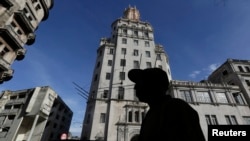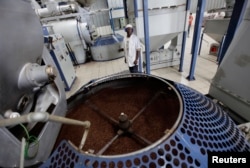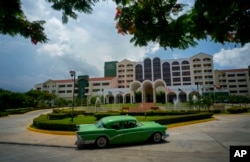Scholars, diplomats and investors who study U.S.-Cuban relations are trying to figure out what will happen to the island's economy and its relations with the United States following the death of longtime Cuban leader Fidel Castro.
The outlook is made more uncertain by the election of Donald Trump, who as U.S. president will bring a far different outlook in Washington than the previous administration.
President Barack Obama resumed diplomatic relations with Cuba after a break of more than 50 years, while Trump's statements and appointments signal a harder line will be taken against the island nation.
Jose Azel, a Cuba scholar at the University of Miami, said Cuba's economy was a "basket case" and would remain "moribund" until Havana changed laws that harm badly needed foreign direct investment.
Azel said investors are now forced to become "minority shareholders" in partnership with the Cuban military and can't hire their own employees. He said Cuba needed to evolve away from a failed system of central planning, but he expressed doubt that there would be much change in the near future.
U.S. visitors
Despite these problems, the recent partial thawing of relations between Washington and Havana has boosted the number of U.S. visitors to Cuba, bringing hard currency to the troubled economy.
Commercial airline service is also resuming between the two nations, and some American firms are operating hotels and seeking permission to operate other businesses in Cuba.
John Kavulich of the U.S. Trade and Economic Council, a business group, said Cuba's economic reforms over the past 10 years have moved forward in fits and starts.
"There is still a tremendous grip that the government bureaucracy has upon entrepreneurship, upon anything that is commercially and economically outside of the government's control," Kavulich said.
Retired U.S. Foreign Service Officer John Caulfield headed the U.S. Interests Section in Havana until 2014. He recounted Cuban President Raul Castro's remarks that reforms were moving forward "without pause, but without hurry."
Caulfield said many Cubans would like change to come more quickly. From the Cuban government's perspective, the changes so far seem significant, he said, but they fall short of what is needed for Cuba to participate in the world economy and prosper.
Limited in economic activity
Cubans are very limited in what sorts of private economic activity they can pursue, he added.
"You can be an electrician or plumber, but you can't have a factory," he said. "You can't be an important service provider or real estate agent." That is a big problem, because such private economic activity is the key to creating wealth and growth.
The former diplomat said it would take foreign investment and expertise to energize Cuba's economy, and those skills and that capital are most likely to come from Cuban entrepreneurs, most of whom left the island over the past 50 or 60 years.
This movement away from a totalitarian system, where all aspects of life were controlled by the government, toward a more open society makes the current government nervous, Caulfield said.
US businesses frustrated
While Cuban officials are worried that changes are coming too fast, U.S. businesses see the pace as frustratingly slow.
Kavulich, of the U.S. Trade and Economic Council, said there is a "tremendous sense of disappointment in the U.S. business community that the president [Obama] did not move in a far more expansive way."
Statements from the new Trump administration, and the outlook of some key nominees, make it seem likely that Trump will take a harder line with Cuba than Obama did.
But it is less clear what impact the scheduled retirement in 2018 of Cuban President Raul Castro, Fidel's younger brother, will have on diplomatic relations and economic growth.
Kavulich said the one thing he could say for certain was that "there is going to be uncertainty."







